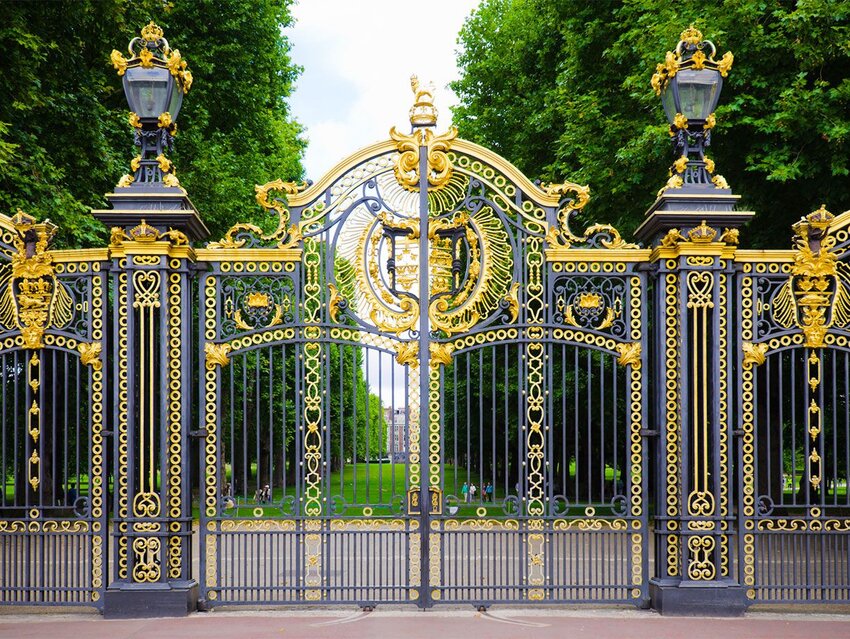Many centuries ago in England, knighthood was one of the greatest honors a man could receive. Even today, it’s a rare and coveted title that is bestowed upon very few people. Unlike nobility, it cannot be inherited, and is only given by a reigning monarch. In ceremonies past, the receiver would kneel with one leg on a gilded stool as the monarch tapped each shoulder with the knighting sword. Today, the classic shoulder-tapping motion is still used to confer the accolade, and while kneeling is no longer required, the rest of the ceremony remains true to tradition.
In the “accolade,” or knighthood ceremony, a monarch bears a royal sword and uses it to tap each shoulder of the would-be knight in turn, a motion known as “dubbing.” The word “accolade” comes from the same spelling in 17th-century French and the Provençal acolada, meaning “to embrace around the neck.” The Latin ad, a common prefix meaning “to” or “toward,” is combined with collum, meaning “neck.”
The act of dubbing began as something more aggressive — a colée, which is a blow to the ear or neck. This was replaced by the light shoulder tap using the flat side of a sword, used symbolically to represent the only blow by a sword to which the knight must not react.
As this ceremony, held to acknowledge an individual’s personal achievements, withstood the test of time, the word “accolade” acquired a more modern usage: Today it means “an expression of praise or admiration” or “an award or privilege granted as a special honor or as an acknowledgment of merit.”
First Knights
Knighthoods likely sprung out of ancient Rome’s chivalric order, Ordo Equestris. Eques comes from the Latin for “horseman,” conjuring the popular image of the cavalry riding on horseback into battle. Indeed, across Europe, knighthood often carried with it a dedication to military service. However, aligning more closely with the word “accolade” today, it also conveyed a sense of worthiness and of belonging to a higher social rank predicated on “good health and character.”
As time progressed, knighthood was absorbed into Christianity, combining love and respect for the church with the duty to protect the most vulnerable members of society. However, as knightly armies dwindled (replaced by foot soldiers), the great value that came with the endowment also began to lose its significance. By the 16th century, knighthood had become a status that the monarch could bestow, transforming it into a symbol of social ranking rather than of bravery and military loyalty.
Sirs and Dames
This more recent definition of knighthood has continued into modern times. Military service is no longer a requirement for knights, and the title is awarded to those considered commendable, either in action or personal values.
The British monarchy describes the qualifications as “a major contribution in any activity, usually at national level. Other people working in the nominee’s area will see their contribution as inspirational and significant, requiring commitment over a long period of time.”
On receiving the accolade, a man will take the prefix “Sir” and a woman will take “Dame.” Modern recipients of knighthood or damehood include Dame Emma Thompson, Dame Maggie Smith, Sir Anthony Hopkins, and Sir Elton John. After knighthood, there are a number of other similar titles. They include, in ranking order, Commander of the Order of the British Empire (CBE), Officer of the Order of the British Empire (OBE), and Member of the Order of the British Empire (MBE). A CBE is for someone with a prominent national or regional role. Physicist Stephen Hawking and playwright Harold Pinter both held a CBE, for example.
An OBE is awarded to someone who is making a significant impact in their industry or community, such as David Beckham. Finally, the MBE is given to those who have become well known for their work, such as contributors in science, health, sports, and charitable endeavors. In recent years, MBE honors have been given to singer Adele and tennis star Emma Raducanu.
While it started out as a ceremony of knighthood, the word “accolade” is mostly used in modern language to refer to a prize, award, or the acknowledgment of great honor. Alongside the official sovereign-endowed awards, an accolade can describe a significant cultural award such as an Oscar or a Grammy, a Nobel Peace Prize, or a Pulitzer. However, it’s also used more loosely for lesser glory, ranging from five-star ratings for restaurants and rave reviews for a piece of theater, to positive Yelp comments and Google reviews. Perhaps unfortunately for the recipients, these usages of the word likely won’t be accompanied by a meeting with a monarch or a new title.
Featured image credit: gregobagel/ iStock

